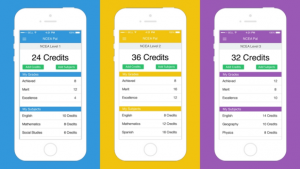 How’s this for the nub of a new business? Develop an app aimed at a known user group that is technically savvy, regenerates annually and is the target of a limited – but very competitive – industry.
How’s this for the nub of a new business? Develop an app aimed at a known user group that is technically savvy, regenerates annually and is the target of a limited – but very competitive – industry.
That’s basically what Jeff King and Wasim Talim have created with NCEA Pal. Within weeks of launching last August, NCEA Pal was gaining more than 1000 downloads a day and nearly all New Zealand universities – as well as the Health Promotion Agency – were paying for advertising space. To date, there have been roughly 35,000 downloads.
The app allows students to track and manage their NCEA progress by logging subjects, assignments, credits and grades received. The idea came from a conversation King, the deputy principal at Rangitikei College, Marton, had with his principal.
“Having no way for students to monitor their NCEA progress is a constant frustration for teachers and senior education leaders,” he says. “It’s particularly tough at the end of the year when students really need to know [where they stand] and they are in the dark.”
King approached Talim (whom he taught at Rongotai College in Wellington). “Wasim and I had worked together on other ventures and he seemed the obvious person for this one.” They worked on the app on and off for about a year and launched it in August 2014. Shortly after, the pair approached BCC and, in mid-January, embarked on BCC’s 90-day intensive accelerator programme.
“Jeff and Wasim approached us because they wanted to turn the NCEA Pal app into a business,” says James Bell-Booth, BCC start-up manager. “We’re working with them on all the typical accelerator topics: tightening up key business processes, identifying goals, smoothing out how they work with customers and putting systems around how they manage cash flow.”
Working with BCC is really helpful, says King. “My background is education – we don’t deal with this sort of thing! BCC is helping us develop our business plan for the next two to three years. I have good contact with the users – I can find out what students want – but I don’t have any experience in building a business.”
Bell-Booth says that the pair is really motivated to create a great product for students and sure, they need money, but they want the way they monetise the business to also be beneficial to students. Consequently, tertiary providers are a main advertising focus and, while generic ads are present in the current version, future versions will be targeted by student interest and NCEA achievements.
“One thing a lot of people don’t realise is that while the universities are all competing with each other for the top students, we know who those students are and what they’re interested in,” says King. “We did the first version on a shoestring budget but now that we have more money [through advertisements], we’re working on tightening the analytics for the next releases.” That will be even more valuable for students and tertiary education providers.
Fingers crossed, the next version will come out around the same time as this issue of BCC News; among other things, ads will be targeted to student subjects. Currently, students need to fill in data and credits; future versions will be self-populating.
Talim, who has nearly finished his bachelor’s in e-commerce and information systems at Victoria University, and King have plenty of ideas for how to further develop the app into an even more useful tool for students. Some of the ideas are around how the app can help students plan their education, and how it can be useful in conversations with teachers and parents.
Posted by